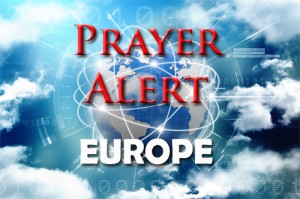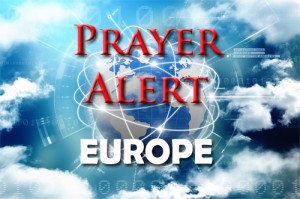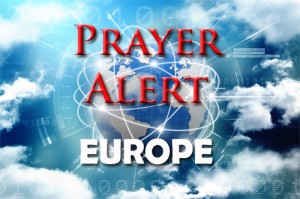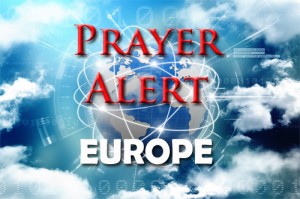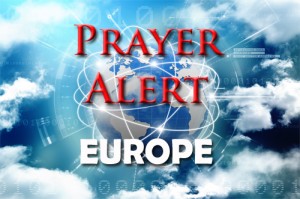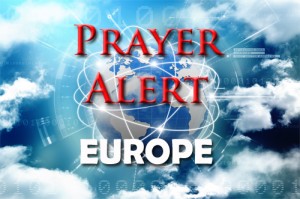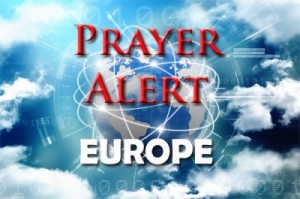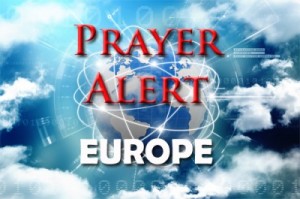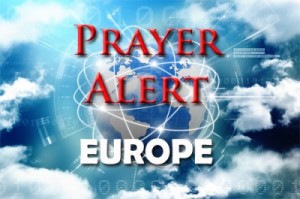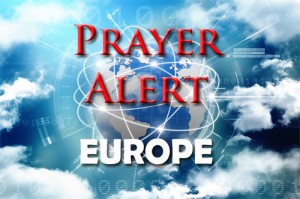Displaying items by tag: Europe
Europol: prayer needs
Europol assists the 28 EU member states in their fight against serious international crime and terrorism. It also works with many non-EU partner states and international organisations to reduce terrorism, drug trafficking, money laundering, organised fraud, euros counterfeiting, and smuggling. But new dangers of online radicalisation and people-trafficking are growing. The networks behind crimes in these areas are quick to seize new opportunities, and are resilient in the face of traditional law enforcement measures. Pray for stronger and wider monitoring of danger through better intelligence-sharing at the highest levels, so that countries can maximise the use of information from all possible sources. Most terrorists have criminal backgrounds, and terrorism is funded by crime. Pray for police across continents to improve the sharing of databases on criminals as they establish an intercontinental cooperation network, so that policing reaches darker places not yet touched by law and order.
France: Macron’s test on labour reforms
France has an unemployment rate of 9.5%, double that of the other big European economies, and President Macron has vowed to cut it to 7% by 2022. The country's unwieldy labour code, 3,000 pages long, is a straitjacket for business. Macron's popularity has plummeted recently as he begins his drive to overhaul the rigid labour laws, giving the details first to the unions and bosses' organisations and later to the public. He promised a ‘revolution’ to free up the energy of the workforce, making it easier for bosses to hire and fire. Protests against the plan, spearheaded by the far left, are expected on 12 September, but two of the biggest unions will not take part.
Europe: terrorists posing as migrants
Faiez Serraj, head of the UN-backed unity government in Tripoli, has said that Europe is at risk from terrorists posing as migrants unless western capitals help Libya stem the numbers crossing the Mediterranean. He claimed that would-be terrorists were among the tens of thousands of people passing unvetted into Italy across its open southern borders. If this is the case, all the EU will be affected. His comments follow last week’s terrorist attacks in Spain, which police have linked to radical groups in North Africa. Nearly 98,000 migrants have crossed from Libya to Italy this year, almost as many as last year, and there are at least another 700,000 in the country. There is clear evidence of a modern-day slave trade on these routes, and Italy’s social and democratic fabric is under threat amid growing public intolerance to migrants.
Germany: feud with Turkey, Alternative for Germany (AfD) perjury
President Erdogan labelled mainstream German political parties and their leaders - including Mrs Merkel - ‘enemies of Turkey’, and called on Turks not to vote for them in Germany’s elections on 24 September. This raised hackles on the German side; Mrs Merkel called it ‘meddling’ in German elections, saying that voters had the right to vote freely, regardless of background. SPD leader Martin Schulz said Erdogan ‘had lost any sense of proportion.’ Meanwhile, AfD leader Frauke Petry faces a perjury fight. Ms Petry moved the AfD to the right after it was founded as an anti-euro movement. In 2016, amid the influx of migrants and refugees into Germany, she suggested that police should ‘if necessary’ shoot at migrants seeking to enter illegally. Now there are calls for her to lose her immunity from prosecution over allegations of perjury (she is suspected of making false statements under oath before a parliamentary committee in November 2015). AfD hopes to enter Berlin’s parliament in September’s election. See also http://www.bbc.co.uk/news/world-europe-40961113
Ireland post-Brexit border proposals
The UK Government has said it does not want any border posts between Northern Ireland and the Republic of Ireland after Brexit. Northern Ireland secretary James Brokenshire insists the proposals are realistic because of the trade involved for all sides. The UK stresses there should be no physical infrastructure, such as customs posts, at the border, which has almost 300 crossing points. Instead, the Government is arguing for a wide-ranging exemption under which small- and medium-sized businesses will not have to comply with any new customs tariffs. If the proposals are accepted, customs officials envisage using a mix of technology and physical checks to monitor the compliance of bigger businesses engaged in international trade. Critics are concerned that an open border might prove to be a ‘back door’ for EU citizens who wish to enter the UK without proper checks.
Spain: Terror Attacks
A mass murder in Barcelona on 17th August by a van driving into a crowd outside a metro station and continuing along Las Ramblas for 500 metres killed thirteen and injuring one hundred. The driver fled on foot. Later, five suspected terrorists were shot dead at Cambrils. The terrorism began on the 16th with an explosion at Alcanar, killing one and wounding sixteen when they were attempting to ‘prepare an explosive device’. The Las Ramblas attack suspect, Driss Oukabir, was arrested after turning himself in. Josep Lluis Trapero, was arrested in Alcanar. Islamic State claimed responsibility. God desires all men to live in peace, pray for peace in the hearts of all affected by these attacks. May God strategically position police and security services across Spain, so that they will be at the right place at the right time to catch all the perpetrators and prevent further attacks.
Russia: ‘Anti-missionary’ punishments
Over 180 individuals and communities have been taken to court since ‘anti-missionary’ punishments came into force on 20 July 2016. Forum 18's list of known cases documents the wide range of people and communities across Russia subjected to such punishments. The 180+ cases were punished for ‘issuing or distribution, within the framework of missionary activity, of literature and printed, audio, and video material without a label bearing this name, or with an incomplete or deliberately false label.’ Both Russians and foreigners were punished under this law, some were fined, some were deported. Vladimir Putin approved this law in a package of anti-terrorism laws and despite prayers and protests from religious leaders and human rights advocates, the Kremlin passed laws against sharing faith in homes, online, or anywhere that is not a recognised church building.
Priest urges people to pray for Paris
Fr Aidan Troy, of St Joseph's, Paris, has called for prayer following a suspected Paris terror attack on 9 August. A car drove into a group of six soldiers from the 35th infantry regiment in Levallois-Perret. The soldiers served in Operation Sentinelle, created to guard prominent French sites after Islamic extremist attacks in 2015. The terrorist was arrested on the A16 highway in northern France. A counter-terrorism investigation was launched. Fr. Aidan said people should pray for Paris, saying that all who care about our world have to keep praying ourselves, and also saying to others 'will you pray with me and we will offer up a prayer for peace’ and I'm convinced that it will happen.’
France: Migrants still in Calais
The closure of the ‘Jungle’ failed to remove migrants from Calais. Since January 17,000+ have attempted to board UK-bound trucks and trains. Migrants haven't gone, they have moved into the woods where they live like animals. There are not as many as a year ago, but there are more than the French government would wish. The French interior minister said there were ‘about 350 ‘. He is wrong. It is clear from spending four days there that the number is much closer to the estimate by volunteers, who say 1,000 are playing a constant game of cat-and-mouse with the police. A recent Human Rights Watch report said that riot police are using brutal methods to disperse new arrivals. Regular attempts are made to remove migrants to processing centres. Some go and some hide. Many who go will return later.
Denmark: Gangland shootings and terror
Copenhagen Police have extended a stop-and-search zone in an attempt to curb gang-related crime, after a series of shooting incidents in the city. The ordinances allow police to stop anyone within a predetermined area and search them for weapons without having probable cause. An organised crime group known as ‘Loyal to Familia’ is partly responsible for the gangland conflict behind the shootings. Loyal to Familia has spread across Denmark from its base in the Nørrebro district of Copenhagen and now appears to have set its sights on Sweden. Swedish police said the gang is trying to build a presence in Malmö and Helsingborg. The gang became active in 2013 and has been involved in many conflicts with rival groups as it expands its territory. See https://www.thelocal.dk/20170731/danish-street-gang-expanding-into-sweden-police.
